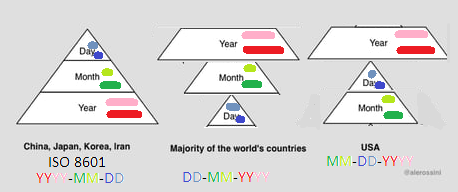But still write dates wrong
Year-Month-Day is the only way. It’s chronological!
day should be first because it’s the one that changes the most often and we read left to right.
Putting the year first makes archiving easier. Your computer literally puts everything in order that way. Day first, and it will be sorted by the most frequently changing element.
Also year first allows you to timestamp your files, so they are sorted by what time you created them that day.
Sorting by day, at the end of the year you’ll have files from the first day of each month grouped together, then the second day, and so on. Still searchable, but not as orderly.
This was something I found strange in the new Alien: Romulus film, why were the temperature readings in a science vessel for a space faring civilisation in Fahrenheit!?
I’m with the whole ‘metric is better crowd’, I mean base 10, c’mon that makes shit easy. On the other hand, I prefer Fahrenheit for temp 100%, Celsius is just not good for it (personal preference I guess). A lot of that is probably due to growing up in the USA, but having lived in a few other countries I just prefer Fahrenheit.
Edit: dang ya’ll, didn’t mean to cause all the drama, I’ll calm down now… I guess personal preferences get taken as personal attacks sometimes lol
Quick Celsius breakdown from a Canadian:
- 40+ - most Canadians stop eating food and hope for a quick death
- 35 - you might just be able to live with this if you do nothing at all
- 28 - right about the place where comfort gives way to a general sense of warmth, something that makes any Canadian uncomfortable
- 23 - room temperature, and why “room temperature IQ” is an insult only Americans could have come up with because their scale was made by a madman
- 15 - If it’s Autumn you are wearing a light jacket, if it’s Spring you are sweating
- 5 - sweater time
- 0 to -10 - that stereotypical TV winter experience, where everyone is skating and sipping hot chocolate? Yeah that’s like half the year here. You better like hot chocolate.
- -15 - We enjoy the fresh air, others will probably find it painful to breathe directly; put on a scarf! Do not brush your teeth immediately before going outside unless you want to experience mint-flavoured pain.
- -20 - Canadians put their boots on by now. Exposed skin on a windy day can get frostbite in as little as 10 minutes.
- -30 - We will debate putting a coat on to put the garbage out at this temperature, usually erring on the side of caution in case your kids lock you outside again. Seriously invest in good winter gear for this, this temperature can kill surprisingly fast and it only gets increasingly unpleasant from here.
- -40 - turns out you can’t form snowballs in hell because the snow is too crispy
Bullshit. ISO 8601 IS THE SUPERIOR DATE STANDARD
Tomorrow is 2024-08-30. DEAL WITH IT.Stardate, 2024-08-30T06:34:17.993Z
Hilariously, Star treks “stardates” are not uniform. The format shifts season to season and show to show.
It’s standardized now
Metric is about measurements, not formatting. The date measurement is in days, months, and years for both ISO 8601 and what’s shown.
While you’re at it, switch over to DD/MM/YYYY for the date format. The only 2 configurations that make sense is that or YYYY/MM/DD. Either go general to specific or specific to general, MM/DD/YYYY makes no sense.
It makes sense because of the way we say the date - eg today is November 21st, 1999. We don’t usually say it’s the 21st of November in conversation.
Eta: I wasn’t giving any value statement for the date order lol. Just explaining the rationale for why the date is written in that order - that’s how people talk. If linguistics as a concept bothers you, well… that’s on you.
Other countries do
Here in the UK we would say “I will visit you on the 19th of September” for example. I have never heard anyone say the month first. It’s just different custom. We also drive on the other side of the road…! At the beginning it would have been helpful if the world would have agreed on a standard either way. Then it would stop confusion. (And less car accidents from people on holiday/vacation on the wrong side of the road! 😅
Months are the craziest, weirdest, stupidest measure humanity has used for this long. ISO8601 week dates make more sense, or even the French Revolutionary Calendar. Humans organize all of society by weeks, not by months. Compare last January to next January, or last February to next February for metrics. Do they have the same number of weekdays vs weekend days? Even if they do, do they happen at the same point in the month so you can compare the flow of the month? Now compare two weeks, and that’s apples to apples. Group by weeks instead of months and your irregular, bumpy graph smooths right out. We only hang on to Gregorian months out of inertia.
Months are one of the best ways for a low-tech/pre-tech culture to keep track of dates (using the Zodiac for something it can actually do—act as a calendar you can see no matter where you are in the world).
Keeping them around is a sensible fail-safe in case some nuclear power sets us back into the dark ages.
No, switch to ISO8601
Overly strict for anything day to day, overly permissive for anything important.
RFC 3339 is where it’s at.TIL.
For purposes of this post though, RFC 3339 and ISO8601 are identical. Dates in the format YYYY-MM-DD, so 2024-08-29 is both RFC3339 and ISO8601 compliant.
Not an expert, just spent around 2 minutes looking at https://ijmacd.github.io/rfc3339-iso8601/
DD/MM/YYYY is absolutely crazy. There is only one format that makes sense.

Just draw the triangle the other way for DD/MM/YYYY. It makes sense that people want to know the day first, that is the most important part tbh
No, the most important part is having a standard to conform to that makes sense, like ISO 8601…
America officially switched to the metric system decades ago. We just don’t use it on a daily basis, but officially the US is metric.
In 1988 Congress passed the Omnibus Trade and Competitiveness Act, which made the metric system the preferred system of weights and measures for U.S. trade and commerce.
In 1991 President Bush issued Executive Order 12770, which mandated the transition to metric measurement for all federal agencies.
I remember learning all metric in elementary school in the early to mid 80s much to my mother’s chagrin (any thing I learned that was different than what/how she learned in Catholic school was bad, including a second language). Then having to relearn standard in middle school. I still have to count all of the lines on a tape measure.
As a metric-raised guy I find extremely difficult following the tutorials of woodworkers that start putting 2feet 3 inches and 9/16 in the measurements that converts to 700,0875mm wich i guess is an approximation of 70cms
August 30 would be 30.08.2024.
Nope, 2024-08-30
This is the only rational order, descending in order of magnitude.
How do you abbreviate a date in YYYY/MM/DD format?
In the DD/MM/YYYY format I can tell someone I am available to meet on 26/07; the year is known contextually as it only changes once a year.
If I start to tell people I am available 26/07 am I available for all of July in 2026?










